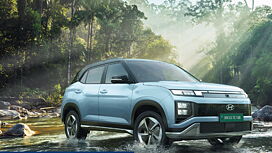Introduction

The EcoSport was launched with a lot of fanfare in 2013. More than two years down the line, it is still Ford’s mainstay in the Indian market as far as numbers are concerned. To keep things fresh, Ford has come out with a facelift version of the compact SUV and changes aren’t just skin deep. While it gets a mild facelift and additional features, Ford has also upgraded the old 1.5-litre diesel engine to the Figo spec. So now the motor makes more power than before which will definitely aid its performance.
In terms of looks, the cosmetic changes are subtle and you have to use a magnifying glass to spot the differences. Apart from the new ‘Golden Bronze’ colour and the new DRL equipped headlamps there are no other cosmetic changes to this compact SUV. Even the boot-mounted spare wheel continues to be in place unlike the updated Ford EcoSport offered abroad. On the plus side, the boot opening switch is moved to a more conventional location under the handle.

How is it on the inside?

Like the exteriors the updated cabin remain largely unchanged. You get the same dashboard, which has a modern and angular design. The centre console is dominated by the wing-like design but on the downside, there are way too many buttons around the music system. With the update, Ford has added some chrome accents which liven up an otherwise drab ambience. To improve ergonomics, Ford has also moved the handbrake lever to the left side (before it was too close to the driver) and the control stalks are also switched to right-hand drive settings. In terms of quality the EcoSport is still not upto the mark. The cabin is marred by hard, albeit, durable plastics and the cabin doesn’t feel premium as it should.

The front seats offer a lot of leg and head room, and the snug seats hold you in place even on spirited drives. At the rear it has just about enough kneeroom but the narrow cabin is a fit just for two. The bench itself though is comfortable with good under thigh support and loads of headroom. However, the large front seats, small windows and all-black cabin do tend to make it claustrophobic. Also, the short 3999mm length affects the boot space, which at 362litres is not very generous.

With the update Ford has added loads of features in this SUV. The EcoSport now gets the latest voice-operated Sync system which apart from Emergency Assistance also includes AppLink. The AppLink, which was first seen in the Fiesta, allows certain apps from your phone to display relevant information on the car’s infotainment system. New features on the top-end variant include automatic headlamps with DRLs, rain-sensing wipers and auto dimming rear view mirror.

How does it drive?

Thanks to the tweaked ECU and modifications to the fixed-geometry turbocharger, power is up to 98bhp (a substantial 10 per cent more than the old engine) and the torque is identical at 205Nm though it comes down at a lower 1750rpm. The main focus of the engine update was to improve driveability and refinement and this shows as soon as you drive the car. For starters, the new engine feels smoother, much more linear and easier to drive than the old car. Where the old engine had pronounced turbo lag under 2000rpm, the new one has a progressive build-up of power, and it’s this far smoother power delivery that masks the feeling of speed in the new car. This makes the EcoSport more urban friendly and gearshifts are kept to a minimum. The EcoSport cruises well too and the strong midrange makes overtaking easy. Our VBOX reveals that the new car is much quicker in terms of in-gear acceleration. In the 20-80kph third-gear slog, the new EcoSport pips the old model by a nearly a second, while in the 40-100kph run in fourth gear, it’s quicker by nearly two seconds. It’s only in flat-out acceleration that the old car matches the new one. The new model does the dash to 100kph in 13.71sec, which is just 0.1sec quicker than the old car.

The suspension remains unchanged so in terms of ride and handling the EcoSport feels the same. At low speeds this compact SUV rides well except for some sharp potholes which rocks the car from side to side due to the high centre of gravity. The Ford’s ride quality isn’t quite as accomplished as the larger Renault Duster or even the Hyundai Creta but on its own it feels comfortable enough. At high speed, the ride is much better and it has a nice supple edge to the way it coasts over a bad patch. Although the electric steering doesn’t exactly bristle with feel, it is direct and lets you place the car confidently through corners. The long wheelbase and wide track gives the car stability through corners but it doesn’t like quick direction changes. In the city the Ford is a user-friendly car thanks to the light steering, soft clutch and easy gearshift. But this is somewhat negated by the high window line and the thick A-pillars which restrict the driver's view.

Why should I buy one?

The EcoSport has always been a very competitive package and with the updated version it is better than ever before. Though the increase in power doesn’t boost outright performance significantly, the diesel version is now a more user-friendly SUV to own and drive. Power is more accessible now owing to a smoother, more responsive engine, and Ford claims that fuel efficiency has improved too. A bigger issue is the interior, which doesn’t boast of the best quality fitments or even space, which is just about adequate. However, this apart, the EcoSport is hard to fault. Especially, when you factor in the price, which at Rs 10.44 lakh for the top-of-the-line diesel still undercuts its larger rivals by some margin, making it a valuable buy.

Where does it fit in?

The EcoSport will get its first direct rival in the form of the soon to launch Maruti Brezza (YBA) compact SUV. Pricewise it can also be compared to the new Mahindra TUV 300 or the lower variants of the Renault Duster, Hyundai Creta and the Maruti S-Cross.


![Ford EcoSport [2015-2017] Image Ford EcoSport [2015-2017] Image](https://imgd.aeplcdn.com/272x153/cw/ec/20482/Ford-EcoSport-Right-Front-Three-Quarter-77975.jpg?wm=0&q=80)





















